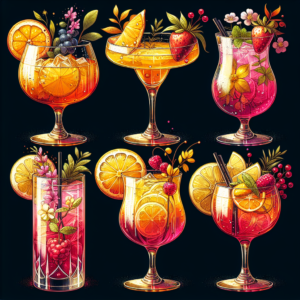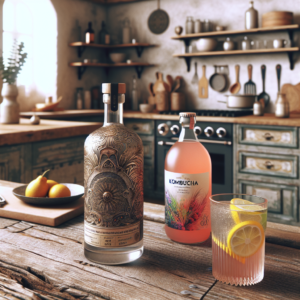
Key Takeaways
Kombucha’s history dates back to ancient China, and it has evolved into a trendy cocktail ingredient.
Its unique fermentation process creates a slightly alcoholic and effervescent base perfect for mixology.
Bartenders have embraced kombucha for its health benefits and distinctive flavor profile.
DIY enthusiasts can easily craft kombucha cocktails at home with a few simple ingredients.
Understanding kombucha’s alcohol content is essential for both enjoying and serving these cocktails responsibly.
Unearthing Kombucha’s Roots in Cocktail Culture
From Ancient Elixir to Modern Mixer
Long before it became a staple in hip bars and restaurants, kombucha was revered for its purported health benefits and mystical origins. Some say its life began over 2,000 years ago in the Qin Dynasty of China, where it was known as the “Tea of Immortality.” It’s the synergy of this rich history and its complex, tangy flavor that makes kombucha an intriguing addition to the cocktail world.
Around 220 BCE: Kombucha is believed to have originated in China during the Qin Dynasty.
Early 20th Century: Kombucha makes its way to Europe, touted for its health benefits.
1960s-1970s: The health-conscious movements in the West begin to adopt kombucha.
1990s: Kombucha gains commercial popularity in health food stores across the U.S.
2000s-Present: Kombucha becomes a trendy ingredient in the craft cocktail scene.
As mixologists, we’re always on the hunt for that perfect ingredient that not only adds depth to our creations but also tells a story. Kombucha fits the bill beautifully. It’s not just about tossing random ingredients together; it’s about crafting an experience. And with kombucha, you’re serving up a glass of history.
The Quest for the Perfect Ferment
The heart of kombucha lies in its fermentation. A Symbiotic Culture Of Bacteria and Yeast (SCOBY) works its magic on sweetened tea, transforming it into a lightly effervescent, slightly tart beverage. It’s this fermentation process that gives kombucha its signature fizz and a trace amount of alcohol, typically less than 0.5%, making it a non-alcoholic drink by most standards.
But for those who crave a bit more kick, hard kombucha, with an alcohol content closer to that of beer, has emerged. This is where kombucha truly shines in the cocktail scene. Its natural effervescence means you can skip the soda, and its acidity can balance or replace citrus in a drink. It’s a mixer that brings its own character to the party.
Chronicle of Kombucha: From Tea to Tipple
Let’s dive into the timeline of this remarkable beverage. From its humble beginnings to its place in today’s cocktail culture, kombucha has been on quite the journey.
Ancient Beginnings and Mythical Origins
The story of kombucha starts in the East, where it was not only consumed for pleasure but also for its supposed healing properties. It traveled along trade routes, gaining popularity in Russia and Europe. But it wasn’t until the 20th century that kombucha began to ferment its way into Western hearts.
“Most agree that around 220 BCE, members of China’s Qin Dynasty began creating recipes for kombucha.”
It’s fascinating to think that what we now enjoy in our cocktails has such a storied past. This historical connection adds an extra layer of enjoyment to each sip. But it’s not just about the past; it’s also about the present and the innovation it brings.
Each step in kombucha’s timeline adds a new chapter to its use in mixology. From ancient health elixir to modern-day cocktail component, kombucha has proven its versatility and staying power.
The West Discovers a Fermented Marvel
As kombucha made its way into Western culture, it began to evolve. What started as a home-brewed health tonic found its way into the mainstream market. The early aughts saw a surge in kombucha’s popularity, with it being sold in natural food stores and, eventually, on tap in bars.
The pivotal moment came when creative bartenders spotted its potential as a cocktail ingredient. They recognized that the complex flavors of kombucha could elevate a drink from ordinary to extraordinary. Plus, its natural carbonation added a desirable effervescence without artificial additives.
“In 2007, kombucha was offered on tap for the first time. This inspired people to begin making kombucha mixed drinks and other concoctions never tried before.”
This marked the beginning of a new era for kombucha cocktails. Bartenders and home mixologists alike began experimenting with kombucha, creating innovative drinks that paid homage to its rich history while breaking new ground in flavor profiles.

Blending Traditions: Kombucha’s Rise in the Drink Scene
When you think about it, kombucha and cocktails are a natural pairing. Both are steeped in tradition yet ripe for innovation. It’s no wonder that kombucha has found a place in the modern drink scene, where bartenders and enthusiasts alike seek to blend the old with the new, the healthy with the indulgent.
Kombucha offers a unique taste that can enhance a variety of cocktails.
Its fermentation process naturally carbonates the drink, adding a fizzy twist to cocktails.
Health-conscious consumers appreciate kombucha’s probiotic qualities, even in an alcoholic mix.
At its core, kombucha brings something to cocktails that few other ingredients can—authenticity and a touch of wellness. This is why you’ll find it being poured in some of the most forward-thinking bars and lounges around the world.
Whether it’s a kombucha-infused Moscow Mule or a tangy take on the Whiskey Sour, this fermented beverage is making waves. And as we continue to see a shift towards more health-conscious drinking, kombucha cocktails are not just a trend; they’re a new tradition in the making.
Enter the Bartenders: Innovation Meets Tradition
Bartenders are the alchemists of the modern age, transforming simple ingredients into liquid gold. With kombucha, they have a secret weapon—an ingredient that’s both ancient and trendy, healthful and spirited. It’s no surprise that some of the most innovative cocktails now feature kombucha as a key player.
“Bartenders recognized that the complex flavors of kombucha could elevate a drink from ordinary to extraordinary.”
What’s happening behind the bar is more than just mixing drinks; it’s about creating a narrative. Kombucha brings a story to each cocktail, one that’s rich with history and bursting with life. As we explore new horizons in mixology, kombucha is not just a fad—it’s a testament to our enduring love affair with fermented foods and drinks.
And let’s not forget the practical side of things. Kombucha’s acidity and fizz make it a versatile mixer, able to stand in for or enhance citrus and carbonation. It’s a bartender’s dream, lending itself to endless experimentation and flavor combinations.
Signature Kombucha Cocktails You Can’t Miss
Some cocktails have become synonymous with kombucha, capturing the essence of this fermented tea and showcasing its mixability. Let’s look at a couple of signature kombucha cocktails that have left a mark on the cocktail landscape.

Kombucha Mule: A twist on the classic Moscow Mule, substituting ginger beer with ginger-flavored kombucha for an extra kick of spice and probiotics.
Booch Margarita: A healthier version of the beloved Margarita, using kombucha to add complexity and reduce the sugar content.
“In the hands of a skilled bartender, kombucha can transform a simple drink into a cocktail masterpiece.”
These drinks are just the beginning. Kombucha’s versatility means it can be used in countless ways, from a simple highball to an intricate, multi-ingredient concoction. As more people discover kombucha’s potential, we can expect to see it starring in an ever-growing repertoire of cocktails.
Shaking It Up: Contemporary Kombucha Mixology
Today’s mixology scene is all about pushing boundaries and exploring new flavors. Kombucha, with its tangy taste and effervescence, has become a darling of innovative bartenders. They’re shaking up the cocktail world by introducing kombucha into their recipes, creating drinks that are not only delicious but also have a hint of wellness.
“Kombucha’s natural carbonation and tart flavor profile make it a go-to for contemporary mixologists looking to shake things up.”
As we look to the future of cocktails, it’s clear that kombucha will play a significant role. Its ability to bridge the gap between health and hedonism, tradition and innovation, makes it an invaluable ingredient in the mixologist’s toolkit.
Whether it’s being used in a boozy brunch beverage or as the base for a sophisticated aperitif, kombucha is redefining what it means to enjoy a cocktail. It’s a sign that our palates are evolving, and that we’re ready for drinks that not only taste good but make us feel good too.
DIY Kombucha Cocktails: A Guide to Crafting at Home
For those who love to dabble in the art of cocktail making at home, kombucha offers a world of possibilities. It’s easy to work with, and you can start with just a few simple ingredients. Here’s how to get started:
Choose a kombucha flavor that complements your spirit of choice. For example, berry kombucha works well with vodka, while a more traditional tea flavor pairs nicely with bourbon.
Consider the sweetness of your kombucha. Some are more sugary than others, so you may need to adjust your recipe accordingly.
Don’t be afraid to experiment. Kombucha is forgiving, and part of the fun is discovering new flavor combinations.
With these tips in mind, you’re well on your way to crafting delicious, probiotic-rich cocktails right in your own kitchen. Who knows, you might just invent the next big kombucha cocktail craze.
Fusion Flavors: Kombucha Goes Global
Kombucha’s journey from ancient China to modern cocktail shakers is a testament to its versatility and universal appeal. Today, it’s not just an American or European trend; kombucha cocktails are being enjoyed worldwide. With each culture adding its own twist, we’re witnessing a global fusion of flavors that’s as exciting as it is delicious.
In Japan, for instance, kombucha is being mixed with sake to create innovative new drinks. In Latin America, it’s finding its way into classic cocktails like the Caipirinha. The possibilities are endless, and the global cocktail community is just starting to tap into kombucha’s potential.
So, whether you’re a seasoned mixologist or a curious home bartender, remember that when you pour kombucha into your glass, you’re not just making a drink—you’re part of a global movement that’s reshaping the world of cocktails. Cheers to that!
The Hard Truth About Hard Kombucha
As kombucha continues to bubble up in bars and homes alike, there’s a growing curiosity about hard kombucha. This boozier cousin of traditional kombucha is fermented longer, resulting in a higher alcohol content that can range from 4% to 7%, similar to many beers. But it’s not just the alcohol content that’s causing a stir; it’s the fact that hard kombucha maintains the probiotic and healthful properties of its non-alcoholic counterpart, making it a guilt-free option for those looking to indulge responsibly.
The Slight Buzz: Understanding Alcohol Content in Kombucha
Traditional kombucha naturally contains a trace amount of alcohol due to fermentation, but it’s usually below the 0.5% threshold that would classify it as an alcoholic beverage. However, hard kombucha goes beyond this limit, offering a tipsier twist on the classic. It’s important to note that while you can enjoy the buzz from hard kombucha, its alcohol content is still lower than that of most wines and spirits, making it a milder choice for social sipping.
Regulatory Acrobatics: Navigating the Alcoholic Landscape
When it comes to selling and distributing hard kombucha, producers must navigate a complex regulatory landscape. Because it contains alcohol, hard kombucha is subject to the same laws and regulations as other alcoholic beverages, which can vary widely from region to region. This means producers must be diligent in their production and labeling practices to ensure they’re in compliance with local laws.
Frequently Asked Questions (FAQ)
Can I get drunk on Kombucha cocktails?
Yes, you can get drunk on kombucha cocktails if they contain hard kombucha or if they’re mixed with other alcoholic beverages. However, the alcohol content in regular kombucha is very low, so it’s unlikely to cause intoxication on its own. As with any alcoholic drink, it’s important to consume kombucha cocktails in moderation.
How does fermentation affect the taste of a Kombucha cocktail?
Fermentation gives kombucha its distinctive tangy flavor and natural effervescence, which can add complexity and depth to cocktails. The longer kombucha ferments, the more pronounced these characteristics become, resulting in a sharper, more acidic taste that can complement or contrast with other ingredients in a cocktail.
Furthermore, the type of tea and sugar used in the fermentation process can influence the final flavor profile of kombucha, allowing for a wide range of taste experiences when used in mixology.
Are there any health benefits to drinking Kombucha in cocktails?
Kombucha is touted for its probiotic content and potential health benefits, which may include aiding digestion and boosting the immune system. When used in cocktails, these benefits can still be present, especially in non-alcoholic or low-alcohol versions. However, it’s essential to remember that adding alcohol to kombucha can negate some of its healthful properties.
“While kombucha cocktails can contain beneficial probiotics, the health impact of the alcohol they contain should not be overlooked.”
It’s a balancing act—enjoying the unique flavors and potential benefits of kombucha while being mindful of alcohol consumption.
What are some popular cocktails that use Kombucha?
Kombucha’s versatility has led to its inclusion in a variety of popular cocktails. Here are a few favorites:
Kombucha Mojito: This refreshing twist on the classic Mojito replaces club soda with kombucha for a probiotic punch.
Kombucha Sangria: A fruity and effervescent take on Sangria, using kombucha as a base for a lighter, healthier version.
Booch Bellini: A delightful brunch option that blends kombucha with peach puree, offering a new take on the traditional Bellini.
These cocktails showcase kombucha’s ability to mingle with a variety of flavors, from sweet to savory, creating drinks that are both enjoyable and conversation starters.
How can I experiment with Kombucha in my own cocktail creations?
Creating your own kombucha cocktails is an exciting way to explore the boundaries of flavor. Here’s how to get started:
Begin with a base of plain or flavored kombucha, depending on the taste profile you’re aiming for.
Choose a spirit that complements the kombucha. Vodka and gin are great options for their neutral profiles, but don’t shy away from whiskey or rum for a bolder taste.
Add fresh ingredients like herbs, spices, or fruit to enhance the flavor and visual appeal of your cocktail.
Experiment with different ratios to find the perfect balance for your palate.
Remember, the key to a great cocktail is balance. Take the time to taste and adjust your creations, and don’t be afraid to try something unconventional. Kombucha’s adaptability means the possibilities are nearly endless.




Leave a Reply